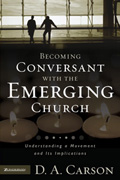
D. A. Carson
Reviewed by: David K. Thompson
Becoming Conversant with the Emerging Church, by D. A. Carson. Published by Zondervan, 2005. Paperback, 256 pages, list price $14.99. Reviewed by elder David K. Thompson.
From the beginning, one of the pillars of our denomination has been its commitment to a thoroughly biblical ecclesiology. Machen's words, in front of us often now as we celebrate the seventieth anniversary of the OPC, speak to this commitment: "We became members, at last, of a true Presbyterian Church." The common confession that drove our fathers to act was best channeled within a visible expression of Christ's body. They sought truth, indeed, but they realized that truth could not be divorced from Christ's bride. They passionately desired to be members of a true church.
Today, such a commitment is under assault. Those leading the attack believe that they are saving Christ's church, not contributing to its destruction. Their method is based on a stark assertion: "Postmodernism has effected such a gigantic and irreversible shift in people's thought patterns that the church is faced with a fundamental choice: adapt so as to respond better to postmodernism, or be relegated to irrelevance" (pp. 127-28). To touch lives, to make a difference in this world, to be Christlike, the traditional model of the church must be radically overhauled. At the heart of this overhaul is postmodern man, awash in community experience, skittish about doctrinal and confessional certainty, and standoffish toward those who make strong claims to truth and morality.
This is the "emerging church" movement, the subject of D. A. Carson's book. The movement, led by such men as Spencer Burke, Brian McLaren, and Todd Hunter, is driven by "the conviction that changes in ... culture signal that a new church is 'emerging.' Christian leaders must therefore adapt to this emerging church. Those who fail to do so are blind to the cultural accretions that hide the gospel behind forms of thought and modes of expression that no longer communicate with the new generation, the emerging generation" (p. 12). The emphasis is placed on "belonging" to a community of faith over against a more traditional notion of "becoming" one of the faithful first. The job of the emergent Christian is to "invite people to belong, welcome them aboard, take them into [his] story ([his] individual story, and the story of [his] local Christian community) and the 'becoming' may well follow" (p. 146). Belief is not a basis for communion, but a potential by-product of it. Join the community of faith now; confess your experience later, if the community of faith has touched you. Unlike our forefathers, emergent Christians have little interest in being members of "a true Presbyterian Church."
This may not be Carson's concern, either, for his analysis of the emerging church movement is decidedly evangelica!. He is a professor of New Testament at Trinity Evangelical Divinity School. He certainly does not frame the debate in the same ecclesiastical and confessional context that I have in this review. Nevertheless, his book is very helpful. Though technically heavy at points, Carson illuminates for us what may well be the issue that occupies the attention of the church for the next generation.
April 13, 2025
Suffering: God’s Purpose in Our Pain
April 06, 2025
Sunday Matters: 52 Devotionals to Prepare Your Heart for Church
March 30, 2025
On the Trail with a Missionary
March 23, 2025
Midnight Mercies: Walking with God Through Depression in Motherhood
March 16, 2025
March 09, 2025
Zwingli the Pastor: A Life in Conflict
March 02, 2025
© 2025 The Orthodox Presbyterian Church